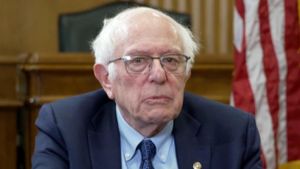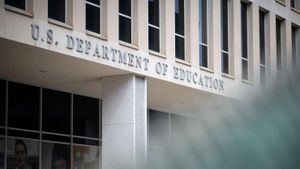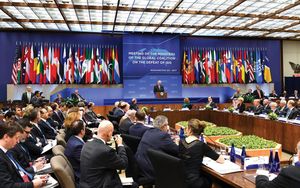Two top security officials at the U.S. Agency for International Development have been placed on administrative leave amid rising tensions within the agency, reflecting significant shifts under the current administration. John Voorhees, the Director of Security, and his Deputy, Brian McGill, were suspended Saturday night following their refusal to grant access to representatives from the Department of Government Efficiency (DOGE), led by Elon Musk, who were seeking to examine classified material within restricted areas of the agency's offices.
This incident marks just the latest upheaval as USAID grapples with sweeping changes instigated by President Trump’s administration, which is considering merging the agency with the State Department and slashing foreign aid budgets. Trump described USAID as being run by ‘a bunch of radical lunatics’ and expressed intentions to overhaul the agency, stating, “We’re getting them out.” With these assertions, he has ignited fears about the future of USAID, which has traditionally operated independently since its establishment by Congress back in 1961.
Weeks prior, the Trump administration initiated mass suspensions, affecting around 60 senior officials and hundreds of contractors, raising alarms over the agency's operational integrity. Concurrently, Matt Hopson, the newly appointed Chief of Staff, also resigned shortly after starting his role, adding to the turbulence. These changes are rooted not only in operational restructuring but also in ideological clashes over USAID’s mission and spending priorities.
The conflict primarily arose due to Musk’s task force demanding unrestricted access to USAID’s internal systems. Musk has been vocal about his grievances concerning the agency, branding it as ‘a criminal organization’ on social media, which has heightened anxiety among USAID employees about their safety and job security. Following the incident, Katie Miller, communications for DOGE, asserted through social media, “No classified material was accessed without proper security clearances,” attempting to quell concerns following the clash.
The agency’s potential integration with the State Department, as suggested by Trump and other officials, remains under discussion within political circles, particularly among Republicans. For example, Rep. Brian Mast, chair of the House Foreign Affairs Committee, articulated his support for moving USAID under the Secretary of State, indicating the agency's challenges as justification for these drastic measures. Mast emphasized on “Face the Nation” his view of USAID's operational failures as reasons for potentially eliminating it as a separate entity.
Such discussions about reducing USAID’s autonomy have generated significant backlash among aid groups, many of which rely on the agency for funding humanitarian efforts worldwide. Paul O’Brien, executive director of Amnesty International, cautioned about the repercussions of dismantling the agency, arguing, “What dismantling USAID doesn’t do is make anyone safer or more prosperous. Congress should immediately step in to challenge this.” His statement highlights the broader consequences of potential cuts to foreign aid, particularly as the agency spent about $38.1 billion on various international assistance programs during the last fiscal year.
While the White House has yet to comment on these developments, employees at USAID are bracing themselves for the outcome of these planned reforms, many fearing the agency's independent status might soon erode altogether. Recent reports reveal the USAID website has gone dark, replaced by limited content on the State Department’s page, hinting at imminent changes aimed at reducing expenditures and increasing efficiency.
The narrative around USAID is indicative of the broader ideological battle over foreign aid within the current U.S. government, which has found itself at odds over the effectiveness and necessity of such agencies. The Trump administration's moves are not only about reallocation of resources but also signal reinforcing the philosophy of reducing governmental roles and curtailing what is seen as ineffective foreign aid projects.
The future of USAID hangs precariously as various factions within the administration propose far-reaching reforms. The latest developments, particularly the suspensions of top officials amid access disputes, serve as indicators of the administration's resolve and unyielding stance toward reassessing the agency’s role on the global stage. This situation continues to evolve, and it remains to be seen how these sweeping changes will affect both employees and millions relying on USAID’s resources worldwide.



